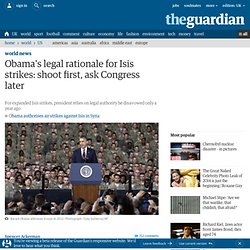

In The 'War On Terror', You Know You're An Extremist When? Peter Dutton, flanked by Tony Abbott, charged into cabinet last week and asked for a power: to strip sole Australian nationals of their citizenship, whom he believes are terrorists, provided they are eligible for citizenship of another country.

The cabinet considered the proposal too extreme. Being rolled by the Liberal Party for being too tough on terror is like being reprimanded for speaking over people at the 2GB meeting. It’s briefly embarrassing, but you still feel like a winner. The proposal has one supporter from the Coalition backbench, and Peter Dutton continues to insist the administrative powers to strip citizenship are necessary. The advocates have obscured the draconian nature of the proposal behind policy-speak. DN! I was an American sniper, and Chris Kyle’s war was not my war. I spent nights in Iraq lying prone and looking through a 12-power sniper scope.

You only see a limited view between the reticles. That’s why it’s necessary to keep both eyes open. This way you have some ability to track targets and establish 360 degrees of awareness. I rotated with my spotter and an additional security team member to maintain vigilance and see the whole battlefield. “The truth is unspeakable”: A real American sniper unloads on “American Sniper” Just Foreign Policy. The number is shocking and sobering.

It is at least 10 times greater than most estimates cited in the US media, yet it is based on a scientific study of violent Iraqi deaths caused by the U.S. -led invasion of March 2003. Remind visitors to your site of the awful human costs of continued war by posting the Iraqi Death Estimator on your website. You can use the code in the box below. Embed: Sign the petition telling Congress that about a million Iraqis have likely been killed since the U.S. A study, published in prestigious medical journal The Lancet, estimated that over 600,000 Iraqis had been killed as a result of the invasion as of July 2006. The estimate that over a million Iraqis have died received independent confirmation from a prestigious British polling agency in January 2008.
This devastating human toll demands greater recognition. American-Sniper-20150110-0019. Chris Kyle built his reputation as a sniper during one of the most criminal operations of the entire occupation of Iraq, the 2nd siege of Fallujah.

What American Sniper offers us — more than a heart-wrenching tale about Chris Kyle’s struggle to be a soldier, a husband, and a father; more than an action packed story about America’s most lethal sniper — is an exposure of the often hidden side of American war culture. The criminality that has characterized American military engagements since the American Indian Wars, and most recently in Iraq and Afghanistan, is hardly noticeable in this film. Fallujah babies: Under a new kind of siege. Fallujah, Iraq - While the US military has formally withdrawn from Iraq, doctors and residents of Fallujah are blaming weapons like depleted uranium and white phosphorous used during two devastating US attacks on Fallujah in 2004 for what are being described as "catastrophic" levels of birth defects and abnormalities.

Dr Samira Alani, a paediatric specialist at Fallujah General Hospital, has taken a personal interest in investigating an explosion of congenital abnormalities that have mushroomed in the wake of the US sieges since 2005. "We have all kinds of defects now, ranging from congenital heart disease to severe physical abnormalities, both in numbers you cannot imagine," Alani told Al Jazeera at her office in the hospital, while showing countless photos of shocking birth defects. As of December 21, Alani, who has worked at the hospital since 1997, told Al Jazeera she had personally logged 677 cases of birth defects since October 2009. 'Incompatible with life'
“Kill every male you see”: Chris Kyle and the role of US snipers in Iraq. Classified Evidence: US Soldiers Raped Boys In Front Of Their Mothers. Obama's legal rationale for Isis strikes: shoot first, ask Congress later. In the space of a single primetime address on Wednesday night, Barack Obama dealt a crippling blow to a creaking, 40-year old effort to restore legislative primacy to American warmaking - a far easier adversary to vanquish than the Islamic State.

Obama’s legal arguments for unilaterally expanding a war expected to last years have shocked even his supporters. Ahead of Wednesday’s speech the White House signaled that Obama already “has the authority he needs to take action” against Isis without congressional approval. Obama said he would welcome congressional support but framed it as optional, save for the authorisations and the $500m he wants to use the US military to train Syrian rebels. Bipartisan congressional leaders who met with Obama at the White House on Tuesday expressed no outrage. The administration’s rationale, at odds with the war it is steadily expanding, is to forestall an endless conflict foisted upon it by a bloodthirsty legislature. Obama’s read on Congress has merit. Another war in the name of humanitarianism: we don’t fight men, we fight monsters.
In 1941, Bertolt Brecht remarked to his diary that “strategy has turned into surgery, an enemy country is ‘opened up’ after it has been anaesthetised, then it is swabbed down, disinfected, sewn up, etc all with the greatest of ease.”

That was the old style of war. These days, invasions are more like social work. Western nations today always fight in the name of humanitarianism, so that contemporary wars possess a distinctive vocabulary and grammar. For instance, each new humanitarian intervention must first distance itself from the previous one. In 2013, when John Kerry argued for military strikes in Syria, he presented his plan as a contrast to previous actions: the Syrian intervention, he said, would not resemble the Libyan intervention.